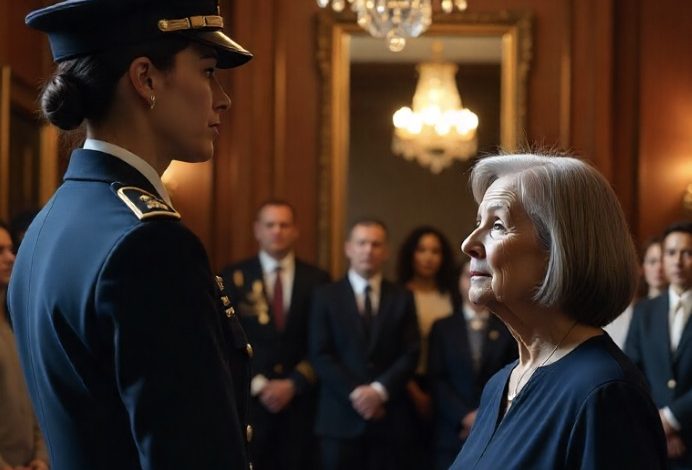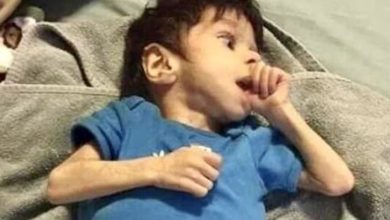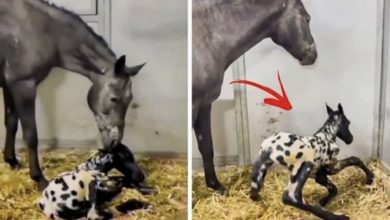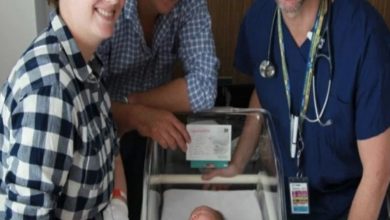“He Laughed at My Dress and Questioned My Worth. What Happened Next Left the Entire Room in Silence”

My brother laughed at me for showing up in a simple black dress that looked like it had come from a clearance rack. But then the Major spoke softly, “Ma’am, your silver stars are visible.” His words cut through the noise like a blade. The laughter ended in an instant. The entire room went silent.
“You’re nothing more than a washed-up security guard who couldn’t even stay in college,” Daniel sneered.
Those cruel words from my younger brother cut through the quiet of the funeral reception like glass breaking. Every head turned toward us, stunned by his outburst. He stood there in his polished suit, chin raised, full of confidence, while our grandmother’s casket rested only a few steps away.
My name is Jessica Morgan, I am forty years old, and that day I had driven eight long hours to say goodbye to the woman who raised me when our parents died. My auburn hair was pulled back in a neat bun, the kind I had worn for years. The plain black dress I wore was the only one I owned, and though it wasn’t fancy, it was respectful. A faint scar above my eyebrow—a scar I had carried since Afghanistan—caught the light as I raised my head and met Daniel’s stare.
Daniel didn’t stop. He thrived on the attention. “Jessica can’t even dress properly for her own grandmother’s funeral. Look at her cheap dress, those scuffed shoes. Grandmother worried about you constantly. She always wondered where she failed with you.”
The whispers started. Our relatives glanced at me with pity, embarrassment, or silent agreement. My Aunt Patricia leaned toward her husband and whispered, “Poor Jessica. She never managed to do anything with her life.” These were the same people who had watched me struggle as a teenager—working three jobs after our parents died, scraping by, then vanishing from their lives fifteen years ago without explanation.
Daniel saw their reaction and pressed harder. “What do you even do these days, Jessica? Some kind of mall guard? A crossing guard for kids? Aunt Pat told me you didn’t even have a phone for years. Is that true?”
I didn’t move. I just stood there, calm, hands folded in front of me. It wasn’t the first time Daniel had tried to tear me down. He had always believed that being louder meant being right.
Then he raised his voice dramatically, pretending to choke up. “Do you know what the saddest part is? Grandmother left her entire estate to both of us. Half to me—someone who actually built a life, has a career, a family, respect in the community. And half to… this.” He waved toward me with mock pity.
The lawyer, Mr. Henderson, who had managed our family’s legal work for decades, shifted in his seat. He checked his watch, clearly uncomfortable with Daniel’s performance.
“I’ll challenge the will,” Daniel announced proudly. “No reasonable court would leave half an estate to someone who can’t even afford shoes without scratches. Once the judge sees Jessica’s life, they’ll understand Grandmother wasn’t thinking straight.”
Several relatives murmured their approval. My cousin Sarah added fuel. “Daniel, you’ve built a business, a real name for yourself. Jessica has been gone so long… none of us even know what she’s been doing.”
“Exactly!” Daniel said. “For all we know, she’s been homeless. Look at her. When was the last time anyone even heard from her?”
The truth of where I had been—Afghanistan, Iraq, bases I couldn’t mention—remained locked inside me. For years I had written unsent letters to Daniel, trying to explain why I had disappeared. But those letters had stayed in my notebook, never mailed.
“She doesn’t even have a real home,” Aunt Patricia added with pity. “How can she manage property when she owns nothing herself?”
The room buzzed with agreement. Daniel’s smirk told me everything—I had walked into an ambush.
Daniel spread his arms wide, savoring the moment. “I’ll make sure Grandmother’s legacy is safe. I’ll keep the family home, keep our name respected. Someone has to.”
Mr. Henderson cleared his throat gently. “If I may—”
“Not now, Henderson,” Daniel snapped, waving him away.
“But—”
“I said not now!” Daniel barked, his face red. “This is family business.”
All eyes turned to me again, filled with judgment. And then it happened—the sound that changed everything.
The sharp, steady click of military shoes against marble.
Everyone turned toward the doorway. Three figures in immaculate uniforms entered. At the front stood Lieutenant Colonel Sarah Hayes, silver oak leaves shining. Beside her walked Major David Fletcher and Captain Amanda Reynolds, both sharp and composed.
“Ma’am,” Colonel Hayes said, standing at attention. She snapped a crisp salute. “Our apologies for the delay. The flight from Washington was held up.”
I returned the salute with the precision of fifteen years of training. My spine straightened automatically. “At ease, Colonel. Thank you for coming.”
Silence crashed over the room. My brother’s breath caught. Aunt Patricia’s face drained of color.
“Ma’am,” Major Fletcher said, stepping forward, “General Morrison asked me to deliver his condolences. The memorial service at Arlington National Cemetery has been scheduled for tomorrow.”
“General… Morrison?” Daniel whispered, his confidence slipping.
Captain Reynolds looked around the room, clearly confused. “Colonel Morgan, we weren’t told this was a civilian gathering. We thought we were attending a military event.”
“This is my grandmother’s funeral,” I said evenly. “These are my relatives.”
The officers exchanged glances. Then Major Fletcher faced the room. His voice was firm. “Colonel Jessica Morgan is Deputy Commander of Joint Special Operations Command. She holds the Distinguished Service Cross, two Silver Stars, and the Defense Superior Service Medal. She has served three tours in Afghanistan, two in Iraq, and coordinates operations across four geographic commands.”
Gasps spread through the crowd.
“And,” Captain Reynolds added, “Colonel Morgan has been nominated for promotion to Brigadier General. Her confirmation hearing is next month.”
The weight of their words hung heavy. The same people who had just called me a failure sat frozen in disbelief.
“Daniel,” I said softly, “you asked me what I do for work.” My brother’s mouth opened and closed without sound. “I serve my country. For fifteen years, I worked in places you couldn’t imagine, doing things I can’t discuss. I missed birthdays, holidays, everything, because I was carrying out missions you will never read about in the paper.”
Colonel Hayes stepped forward. “If I may, Colonel Morgan is one of only three women at her level in Special Operations Command. Her record is unmatched.”
I nodded to her, then turned to my family. “You wonder why I don’t own a house? Because I’ve lived on military bases. Why don’t I have a phone number you can call anytime? Because I move between secure facilities. Why is my dress simple? Because I’ve learned that expensive clothes don’t matter when you’re carrying a wounded soldier to safety.”
Aunt Patricia whispered, pale, “Jessica… we had no idea.”
“No,” I said, calm but steady. “You didn’t know because you never asked. You assumed. You judged. You believed the worst.”
Daniel stammered. “But… I called your apartment once! They said you had moved with no address!”
“I had been deployed to Afghanistan,” I replied. “Training forces, running missions. I couldn’t leave an address.”
The room sat in stunned silence.
“You want to challenge Grandmother’s will?” I asked, my voice quiet but firm. “You think I don’t deserve it because I don’t look rich? Do you know what a Colonel’s pay looks like after fifteen years, plus combat duty?” I pulled a folded document from my purse. “This is my financial disclosure form. I could buy ten houses like Grandmother’s outright. But this was never about money. It was about respect.”
Mr. Henderson finally spoke again. “Your grandmother left a letter. She asked me to read it if her will was ever questioned.” He opened it carefully and began.
“‘To my family,’” he read, “‘I know some of you may doubt why I left half of my estate to Jessica. But I want you to know she never abandoned me. For fifteen years, she called me every week—sometimes from airports, sometimes from secure bases. She sent photos of soldiers she served with, not herself. She told me about writing to the families of fallen men, about her nightmares, about her burden of command. She sacrificed everything for her country. She is the bravest person I know.’”
Tears filled the room. Daniel collapsed into a chair, covering his face.
“‘If anyone doubts Jessica deserves what I leave her,’” Henderson continued, “‘then they never knew her. And if they never knew her, it is because they never tried.’”
The letter ended. Silence reigned.
“Daniel,” I said gently, “I never stopped being your sister. But I also became something else. And you chose to assume the worst.”
Daniel lifted his face, wet with tears. “Jessica… I’m sorry. I’m so sorry.”
“I know,” I answered. “But words don’t erase the damage.” I turned to the others. “I’ll be returning to duty. Lawyers will handle the estate. I forgive you, but forgiveness doesn’t mean forgetting.”
Colonel Hayes touched my arm. “Ma’am, we should leave. You have a briefing tomorrow.”
I turned to Daniel one last time. “Grandmother taught me strength isn’t about striking others. It’s about enduring and still choosing kindness.”
He whispered, “Is there any chance we can rebuild trust?”
“Trust,” I replied, “is built through actions. You’ll have to prove who you want to be.”
At the doorway, I added, “Oh—and Grandmother’s house? I’m donating it to a veteran housing program. Too many soldiers sleep on streets for me to care about property fights.”
As we left, Major Fletcher said softly, “Ma’am, you handled that with grace.”
“Not grace,” I replied. “Just years of knowing you can’t control what others think. Only what you stand for.”
The car carried me away, my reflection in the window showing a forty-year-old woman in a plain black dress, scarred but unbroken, carrying fifteen years of honor. My family had learned a hard truth: assumptions reveal more about those who make them than those they target.
I no longer needed their approval to know my worth. I had earned it in mountains, deserts, and battlefields. And though betrayal from family cuts deepest, I knew my strength came from choosing service and compassion over bitterness.










